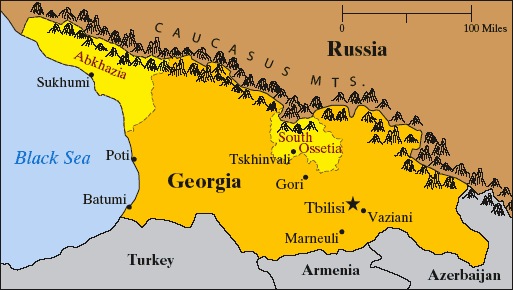George Friedman in the New York Review of Books. Certainly the clearest exposition of recent events in Georgia that I’ve come across.
Georgia and the Balance of Power
The Russian invasion of Georgia has not changed the balance of power in Eurasia. It has simply announced that the balance of power had already shifted. The United States has been absorbed in its wars in Iraq and Afghanistan, as well as potential conflict with Iran and a destabilizing situation in Pakistan. It has no strategic ground forces in reserve and is in no position to intervene on the Russian periphery. This has opened an opportunity for the Russians to reassert their influence in the former Soviet sphere. Moscow did not have to concern itself with the potential response of the United States or Europe; hence, the balance of power had already shifted, and it was up to the Russians when to make this public. They did that on August 8.
Let’s begin simply by reviewing recent events. On the night of Thursday, August 7, forces of the Republic of Georgia moved across the border of South Ossetia, a secessionist region of Georgia that has functioned as an independent entity since the fall of the Soviet Union (see map).
They drove on to the capital, Tskhinvali, which is close to the border. Georgian forces got bogged down while trying to take the city. In spite of heavy fighting, they never fully secured it, nor the rest of South Ossetia.
…
By invading Georgia as Russia did (competently if not brilliantly), Putin reestablished the credibility of the Russian army. (It was no surprise that its operations would render thousands of people homeless and cause civilian casualties.) But far more importantly, Putin’s invasion revealed an open secret. While the United States is tied down in the Middle East, American guarantees have no value. This lesson is not for American consumption. It is something that, from the Russian point of view, the Ukrainians, the Balts, and the Central Asians need to digest. Indeed, it is a lesson Putin wants to transmit to Poland and the Czech Republic as well. In July, the Czech government signed an agreement with the United States to set up a ballistic missile defense installation in the Czech Republic, and in August, days after the conflict in Georgia began, the Polish government announced that it has agreed to allow the Americans to build an anti-missile base in Poland. The US–Polish agreement was hurriedly signed as a gesture of defiance to the Russians. The Russians responded with threats that Condoleezza Rice dismissed as “bizarre.”
The Russians knew that the United States would denounce their attack. This actually plays into Russian hands. The more vocal senior US leaders are, the greater the contrast with their inaction, and the Russians wanted to drive home the idea that American guarantees are empty talk. The Russians also know something else that is of vital importance. For the United States, the Middle East is far more important than the Caucasus, and Iran is particularly important. The United States wants the Russians to participate in sanctions against Iran. Even more importantly, it does not want the Russians to sell weapons to Iran, particularly the highly effective S-300 air defense system. Georgia is a marginal issue to the United States; Iran is a central issue. The Russians are in a position to pose serious problems for the United States not only in Iran, but also with weapons sales to other countries, like Syria.
(via Hullabaloo)
